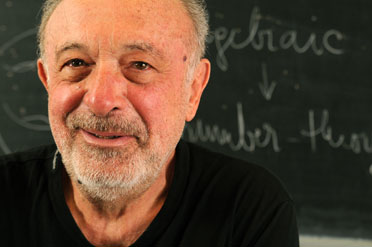Passion discovered
By Amy Braverman Puma
Photography by Lloyd DeGrane
In 1956 Peter Freund, then studying at the Polytechnic Institute of Timişoara in his native Romania, marched in an anti-Soviet protest. Communist soldiers surrounded the protesters, and Freund and his friends were put on a truck, driven away, and told to line up between a wall and a row of tanks. “They were going to mow us down,” Freund says.
 The marchers’ adrenaline pumping, they chanted slogans. The soldiers, meanwhile, received conflicting orders, first turning the guns toward the protesters, then away. Eventually, as Freund tells it, he and two friends persuaded the soldiers that they weren’t part of the protest. They had been on their way to the library, they said, when they got caught up with the large group. The soldiers let them, and eventually the rest of the crowd, go.
The marchers’ adrenaline pumping, they chanted slogans. The soldiers, meanwhile, received conflicting orders, first turning the guns toward the protesters, then away. Eventually, as Freund tells it, he and two friends persuaded the soldiers that they weren’t part of the protest. They had been on their way to the library, they said, when they got caught up with the large group. The soldiers let them, and eventually the rest of the crowd, go.
Freund, a professor emeritus of physics, mentions this story only in the preface of his book, A Passion for Discovery (World Scientific, 2007); in the proper chapters he tells how many path-breaking scientists have coped with wars, discrimination, and other historical events—an interest that stems from his own experience. He shared some of those tales in January at a Divinity School Wednesday lunch. While the guests ate lentil soup and biscuits, Freund told gripping tales animated by his Eastern European accent and his broadly flying arms.
He opened with Emmy Noether, a German mathematician who contributed to Einstein’s theory of relativity, proving a theorem that connects symmetry in nature with laws of conservation. Her colleague David Hilbert tried to get Noether promoted at the University of Göttingen, where she was an unpaid research assistant, but the university refused to pay a salary to a woman. (Hilbert supposedly replied: “I don’t see why the gender of the candidate is relevant. After all, our department does not run any public baths.”)
After World War I Noether switched to pure mathematics—she eventually laid the groundwork for abstract algebra—and became an unpaid associate professor. Although she performed the editor-in-chief duties for the journal Mathematische Annalen, she wasn’t listed as its editor.
By 1932 Noether was recognized for her mathematics and physics contributions, and she won a prestigious German award. But a year later, when Hitler came to power, the government banned Jews from university teaching, and Noether fled to America. There gender still played a role; she was sent to the women’s college Bryn Mawr rather than the Institute for Advanced Study in Princeton. When she died of cancer in 1935 at age 53, a brief obituary appeared in the New York Times, and later a letter to the editor called Noether “the most significant creative mathematical genius thus far produced since the higher education of women began.” The letter was signed by Albert Einstein.
From Noether’s connecting symmetry in nature with conservation, Freund moved on to much earlier science—when laws of nature were still a new idea. Discussing Pierre Louis Moreau de Maupertuis gave Freund “the opportunity to bring in God, since we’re in the Divinity School,” he said to laughter. A Frenchman who in 1736 traveled to Lapland and confirmed Newton’s prediction that the earth was an oblate spheroid, Maupertuis tried to reconcile laws of nature with God’s existence. “Before Newton,” Freund explained, “people thought a solar eclipse was the wrath of God. After Newton you could predict exactly when it would come, and you knew it was nothing to be scared of.” But science, he said, had “robbed the omnipotent being of one of his powers; he can’t scare us anymore with a solar eclipse.”
Maupertuis postulated that God made laws of nature “so he didn’t have to worry about every pebble on the beach moving in the right direction,” Freund said. And because Scripture was full of directives to please God, the Frenchman theorized that those laws would be ones to maximize God’s pleasure—the unlikely beginnings of physics’ and mathematics’ least-action principle.
During the Q&A Freund—on Chicago’s faculty since 1965 and an originator of two-component duality, an impetus to develop string theory—discussed his own place in history. Because his physician-father ran a private clinic, he was considered a capitalist, and the Soviets wouldn’t accept sons of capitalists into college. In 1953 Stalin died, and Freund entered university. Had history taken a different turn, he might not have participated in the Romanian protest. And then he might not have followed his own path from dissent to discovery, like the scientists whose tales he shared with the Divinity School lunchers.
Return to top